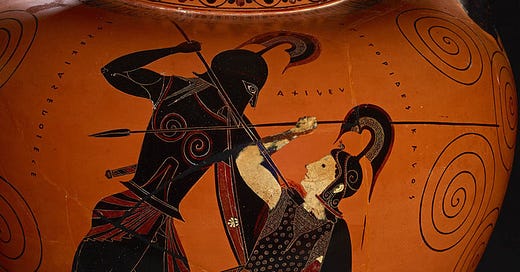Author’s Note: This essay serves as the introduction to a new series on the history, theory, and practice of warfare. While this new history series will be behind a paywall, all content related to the ongoing Russo-Ukrainian War will continue to be available for free. My intention for paid subscribers is to publish between two and four entries in the battle series per month.
War is perhaps the single most paradoxical experience in the entire range of human enterprises. It is impossible to deny the variegated horrors of wartime - the death and horrible wounding of the warriors; the psychological trauma that can plague even the victors; the destruction of the physical landscape, of homes, of temples and churches; hunger and disease; orphans and widows made refugee. Wartime manifests as tragedy, yet it retains a powerful allure. War is catastrophe, but it is also exhilarating and an object of intense intellectual fascination. It is frequently the setting for mankind’s most brutish behaviors, but it also provokes the purest expression of many high virtues: courage, sacrifice, fortitude, and love.
Confederate General Robert E Lee (famous or infamous, depending on who you ask) spoke rightly at the Battle of Fredericksburg when he said “It is well that war is so terrible, or we should grow too fond of it.”
Within the context of wartime - which includes the full range of political and economic efforts related to sustaining armed conflict - battle is a very special enterprise. Mass combat - the attempt to use armed force to destroy the enemy’s moral or physical ability to wage war - is a sort of existential singularity, and it is this which makes it deeply alluring and fascinating. In battle, all of life collapses in on itself, and the parties involved - both the armies as a whole and the individual warriors - engage in the purest sort of contest. Battle is an un-cheatable test of will, courage, and competence.
In 1937, a Japanese soldier preparing for deployment wrote the following in his diary:
Every night my dreams are not about my home, not about my wife and children, but actually an image of myself on the battlefield. The most beautiful thing in the world is truth… If there is anything beautiful about war, it is that “truth” that only war can possess.
What he meant by this “truth” was this unique experience of existential singularity. In our daily lives, the horizon of existence is blurry - the cares of life mediate between you and the possibility of death. For the soldier in battle, however, this intrusion is dissolved, and he is at every moment confronted with a simple, dichotomous choice as his existence collapses in on the moment: kill or be killed, victory or defeat. This is the truth which is both the exhilaration and the terror of battle - and it cannot be cheated.
The verdict of battle is absolute and unalterable once rendered; it is the perfect contest of strength - the “iron dice”, which cannot be swayed with words, political intrigue, or propaganda. In the larger political exercise of war, of course, all of these things can matter, but in the application of armed force on the battlefield itself, it is only that armed force which matters, and no law governs the field of combat except the law of life and death, which requires that one army must vanquish another.
Keep reading with a 7-day free trial
Subscribe to Big Serge Thought to keep reading this post and get 7 days of free access to the full post archives.



